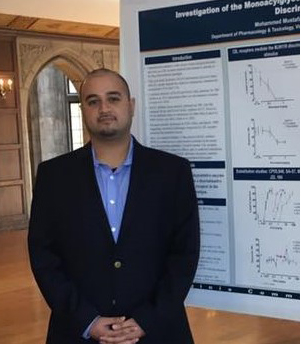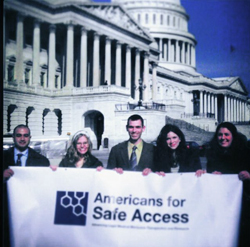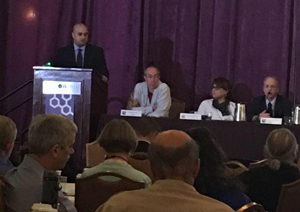Mohammed Mustafa, Virginia
Activism takes many forms and finds many inspirations. For pharmacologist Mohammed Mustafa, interest in medical cannabis came from realizing a close family member who died from cancer could have eased the devastating effects of chemotherapy with cannabis, if it had been available.

But the treatment was in a D.C.-area hospital in the days before safe access.
"When I got older and discovered how cannabis can help with chemotherapy, I became determined to help other families with access," Mohammed says.
His academic background had always been science, mostly biology and psychology. As his interest in medical cannabis grew, he made study of the endocannabinoid system (ECS) the focus of a project while getting an Associate’s degree, then went on to a Bachelors. He is now enrolled in graduate school pursuing a Master’s degree and research on the ECS.

Mohammed got involved with advocacy in 2012 when he attended an ASA chapter meeting in San Francisco during a trip there and discovered there was a chapter in D.C., too. On his return to the D.C. area, he connected with the chapter and went to work on implementing the medical cannabis program the District Council had enacted in 2010. Together with other advocates, he helped expand the limited qualifying conditions and make it easier to obtain a doctor’s recommendation. When he started, D.C. had no recommendation forms for physicians, but lobbying the council made the difference.
Following that, Mohammed moved to Richmond, Virginia and helped found ASA's Safe Access Virginia chapter (pictured right at an early organizing meeting in 2013). They began lobbying the commonwealth’s General Assembly to defeat a bad bill that would have blocked safe access and got it tabled. The next year, they were back with patients and the families of children with seizure disorders and got an affirmative epilepsy law passed. In the past three years, he’s helped add regulated commercial cultivation to the law and expand who can qualify.
 As a pharmacologist in a behavioral lab working on cannabinoids, Mohammed sees his role as making sure advocates have talking points backed by science when they’re educating policy makers on how cannabis can treat pain, anxiety, and other conditions. He has presented at local and international cannabinoid science conferences and co-authored several peer-reviewed publications with prominent cannabinoid scientists such as Raphael Mechoulam.
As a pharmacologist in a behavioral lab working on cannabinoids, Mohammed sees his role as making sure advocates have talking points backed by science when they’re educating policy makers on how cannabis can treat pain, anxiety, and other conditions. He has presented at local and international cannabinoid science conferences and co-authored several peer-reviewed publications with prominent cannabinoid scientists such as Raphael Mechoulam.
“The medical cannabis industry is moving so much faster than science,” Mohammed says. “I want to bridge the gap by helping develop consistent cannabinoid medicines that are appropriate and address side effects.”
Mohammed is currently working on models of chemotherapy-induced neuropathy, the type of nerve pain for which clinical trials have shown cannabis to be efficacious, often more so than opioids.
“As an advocate, I can make a difference by creating better understanding of how cannabinoids interact with the ECS.
This profile was originally published in the November 2018 ASA Activist Newsletter
Share this page





















